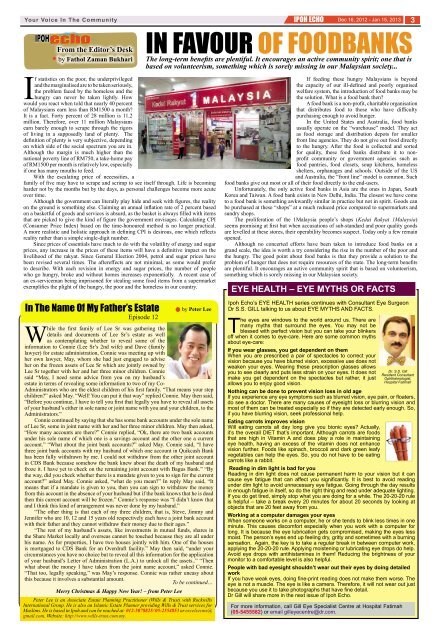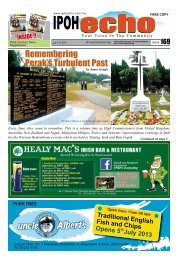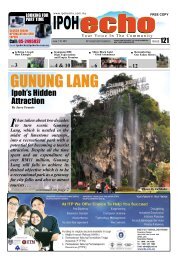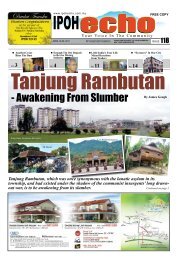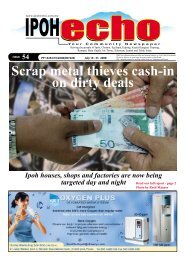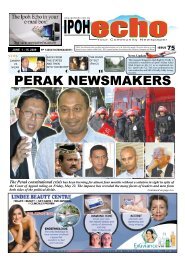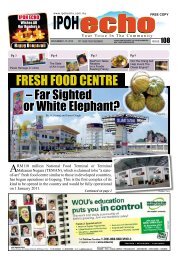You also want an ePaper? Increase the reach of your titles
YUMPU automatically turns print PDFs into web optimized ePapers that Google loves.
Your Voice In The Community IPOH ECHO Dec 16, 2012 - Jan 15, 2013 3<br />
IPOHecho echo<br />
From the Editor’s Desk<br />
by Fathol Zaman Bukhari<br />
If statistics on the poor, the underprivileged<br />
and the marginalised are to be taken seriously,<br />
the problem faced by the homeless and the<br />
hungry can never be taken lightly. How<br />
would you react when told that nearly 40 percent<br />
of Malaysians earn less than RM1500 a month?<br />
It is a fact. Forty percent of 28 million is 11.2<br />
million. Therefore, over 11 million Malaysians<br />
earn barely enough to scrape through the rigors<br />
of living in a supposedly land of plenty. The<br />
definition of plenty is very subjective, depending<br />
on which side of the social spectrum you are in.<br />
Although the margin is much higher than the<br />
national poverty line of RM750, a take-home pay<br />
of RM1500 per month is relatively low, especially<br />
if one has many mouths to feed.<br />
With the escalating price of necessities, a<br />
family of five may have to scrape and scrimp to see itself through. Life is becoming<br />
harder not by the months but by the days, as personal challenges become more acute<br />
over time.<br />
Although the government can literally play hide and seek with figures, the reality<br />
on the ground is something else. Claiming an annual inflation rate of 2 percent based<br />
on a basketful of goods and services is absurd, as the basket is always filled with items<br />
that are picked to give the kind of figure the government envisages. Calculating CPI<br />
(Consumer Price Index) based on the time-honoured method is no longer practical.<br />
A more realistic and holistic approach in defining CPI is desirous, one which reflects<br />
reality rather than a simple single-digit number.<br />
Since prices of essentials have much to do with the volatility of energy and sugar<br />
prices, any increase in the prices of these items will have a definitive impact on the<br />
livelihood of the rakyat. Since General Election 2004, petrol and sugar prices have<br />
been revised several times. The aftereffects are not minimal, as some would prefer<br />
to describe. With each revision in energy and sugar prices, the number of people<br />
who go hungry, broke and without homes increases exponentially. A recent case of<br />
an ex-serviceman being imprisoned for stealing some food items from a supermarket<br />
exemplifies the plight of the hungry, the poor and the homeless in our country.<br />
In The Name Of My Father’s Estate<br />
Episode 12<br />
by Peter Lee<br />
While the first family of Lee Sr was gathering the<br />
details and documents of Lee Sr’s estate as well<br />
as contemplating whether to reveal some of the<br />
information to Connie (Lee Sr’s 2nd wife) and Dave (family<br />
lawyer) for estate administration, Connie was meeting up with<br />
her own lawyer, May, whom she had just engaged to advise<br />
her on the frozen assets of Lee Sr which are jointly owned by<br />
Lee Sr together with her and her three minor children. Connie<br />
said “May, I need some advice from you on my husband’s<br />
estate in terms of revealing some information to two of my Co-<br />
Administrators who are the eldest children of his first family. “That means your step<br />
children?” asked May. “Well! You can put it that way” replied Connie. May then said,<br />
“Before you continue, I have to tell you first that legally you have to reveal all assets<br />
of your husband’s either in sole name or joint name with you and your children, to the<br />
Administrators.”<br />
Connie continued by saying that she has some bank accounts under the sole name<br />
of Lee Sr, some in joint name with her and her three minor children. May then asked,<br />
“How many accounts are there?” Connie replied, “Ok, there are two bank accounts<br />
under his sole name of which one is a savings account and the other one a current<br />
account.” “What about the joint bank accounts?” asked May. Connie said, “I have<br />
three joint bank accounts with my husband of which one account in Quikcash Bank<br />
has been fully withdrawn by me. I could not withdraw from the other joint account<br />
in CDS Bank because somehow the bank knew about the death of my husband and<br />
froze it. I have yet to check on the remaining joint account with Bagus Bank.” “By<br />
the way, did you check whether there is a mandate given to you to sign for the current<br />
account?” asked May. Connie asked, “what do you mean?” In reply May said, “It<br />
means that if a mandate is given to you, then you can sign to withdraw the money<br />
from this account in the absence of your husband but if the bank knows that he is dead<br />
then this current account will be frozen.” Connie’s response was “I didn’t know that<br />
and I think this kind of arrangement was never done by my husband.”<br />
“The other thing is that each of my three children, that is, Steve, Jimmy and<br />
Jennifer who are 10, 12 and 15 years old respectively each have a joint bank account<br />
with their father and they cannot withdraw their money due to their ages.”<br />
“The rest of my husband’s assets, like investments in mutual funds, shares in<br />
the Share Market locally and overseas cannot be touched because they are all under<br />
his name. As for properties, I have two houses jointly with him. One of the houses<br />
is mortgaged to CDS Bank for an Overdraft facility.” May then said, “under your<br />
circumstances you have no choice but to reveal all this information for the application<br />
of your husband’s Letter of Administration (L.A.) to unlock all the assets..” “Then<br />
what about the money I have taken from the joint name account,” asked Connie.<br />
“That too, legally speaking,” was May’s response. Connie was rather uneasy about<br />
this because it involves a substantial amount.<br />
To be continued…<br />
Merry Christmas & Happy New Year! – from Peter Lee<br />
Peter Lee is an Associate Estate Planning Practitioner (Wills & Trust) with Rockwills<br />
International Group. He is also an Islamic Estate Planner providing Wills & Trust services for<br />
Muslims. He is based in <strong>Ipoh</strong> and can be reached at: 012‑5078825/ 05‑2554853 or excelsecms@<br />
gmail.com. Website: http://www.wills-trust.com.my.<br />
IN FAVOUR OF FOODBANKS<br />
The long-term benefits are plentiful. It encourages an active community spirit; one that is<br />
based on volunteerism, something which is sorely missing in our Malaysian society...<br />
If feeding these hungry Malaysians is beyond<br />
the capacity of our ill-defined and poorly organised<br />
welfare system, the introduction of food banks may be<br />
the solution. What is a food bank then?<br />
A food bank is a non-profit, charitable organisation<br />
that distributes food to those who have difficulty<br />
purchasing enough to avoid hunger.<br />
In the United States and Australia, food banks<br />
usually operate on the “warehouse” model. They act<br />
as food storage and distribution depots for smaller<br />
front line agencies. They do not give out food directly<br />
to the hungry. After the food is collected and sorted<br />
for quality, these food banks distribute it to nonprofit<br />
community or government agencies such as<br />
food pantries, food closets, soup kitchens, homeless<br />
shelters, orphanages and schools. Outside of the US<br />
and Australia, the “front line” model is common. Such<br />
food banks give out most or all of their food directly to the end-users.<br />
Unfortunately, the only active food banks in Asia are the ones in Japan, South<br />
Korea and Taiwan. A food bank exists in New Delhi, India. The closest we have come<br />
to a food bank is something awkwardly similar in practice but not in spirit. Goods can<br />
be purchased at these “shops” at a much reduced price compared to supermarkets and<br />
sundry shops.<br />
The proliferation of the 1Malaysia people’s shops (Kedai Rakyat 1Malaysia)<br />
seems promising at first but when accusations of sub-standard and poor quality goods<br />
are levelled at these stores, their operability becomes suspect. Today only a few remain<br />
opened.<br />
Although no concerted efforts have been taken to introduce food banks on a<br />
grand scale, the idea is worth a try considering the rise in the number of the poor and<br />
the hungry. The good point about food banks is that they provide a solution to the<br />
problem of hunger that does not require resources of the state. The long-term benefits<br />
are plentiful. It encourages an active community spirit that is based on volunteerism,<br />
something which is sorely missing in our Malaysian society.<br />
EYE HEALTH – EYE MYTHS OR FACTS<br />
ipoh echo’s eYe HeALTH series continues with Consultant eye surgeon<br />
Dr s.s. GiLL talking to us about eYe MYTHs AND FACTs.<br />
The eyes are windows to the world around us. There are<br />
many myths that surround the eyes. You may not be<br />
blessed with perfect vision but you can take your blinkers<br />
off when it comes to eye-care. Here are some common myths<br />
about eye-care:<br />
If you wear glasses, you get dependent on them<br />
When you are prescribed a pair of spectacles to correct your<br />
vision because you have blurred vision, excessive use does not<br />
weaken your eyes. Wearing these prescription glasses allows<br />
you to see clearly and puts less strain on your eyes. it does not<br />
make you get dependent on the spectacles but rather, it just<br />
allows you to enjoy good vision.<br />
Dr. S.S. Gill<br />
Resident Consultant<br />
Ophthalmologist,<br />
Hospital Fatimah<br />
Nothing can be done to prevent vision loss in old age<br />
If you experience any eye symptoms such as blurred vision, eye pain, or floaters,<br />
do see a doctor. There are many causes of eyesight loss or blurring vision and<br />
most of them can be treated especially so if they are detected early enough. so,<br />
if you have blurring vision, seek professional help.<br />
Eating carrots improves vision<br />
Will eating carrots all day long give you bionic eyes? Actually,<br />
it’s the overall DieT that’s important. Although carrots are foods<br />
that are high in Vitamin A and does play a role in maintaining<br />
eye health, having an excess of the vitamin does not enhance<br />
vision further. Foods like spinach, broccoli and dark green leafy<br />
vegetables can help the eyes. so, you do not have to be eating<br />
carrots like a rabbit.<br />
Reading in dim light is bad for you<br />
Reading in dim light does not cause permanent harm to your vision but it can<br />
cause eye fatigue that can affect you significantly. It is best to avoid reading<br />
under dim light to avoid unnecessary eye fatigue. Going through the day results<br />
in enough fatigue in itself, so do the right thing and read under adequate lighting.<br />
if you do get tired, simply stop what you are doing for a while. The 20-20-20 rule<br />
is helpful – take a break every 20 minutes for about 20 seconds by looking at<br />
objects that are 20 feet away from you.<br />
Working at a computer damages your eyes<br />
When someone works on a computer, he or she tends to blink less times in one<br />
minute. This causes discomfort especially when you work with a computer for<br />
long. it is because the eye lubrication gets compromised, making the eyes less<br />
moist. The person’s eyes end up feeling dry, gritty and sometimes with a burning<br />
sensation. Again, the key is to take a regular break in between computer work,<br />
applying the 20-20-20 rule. Applying moistening or lubricating eye drops do help.<br />
Avoid eye drops with antihistamines in them! Reducing the brightness of your<br />
monitor to a comfortable level is also helpful.<br />
People with bad eyesight shouldn’t wear out their eyes by doing detailed<br />
work<br />
If you have weak eyes, doing fine-print reading does not make them worse. The<br />
eye is not a muscle. The eye is like a camera. Therefore, it will not wear out just<br />
because you use it to take photographs that have fine detail.<br />
Dr Gill will share more in the next issue of ipoh echo.<br />
For more information, call Gill eye specialist Centre at Hospital Fatimah<br />
(05-5455582) or email gilleyecentre@dr.com.


